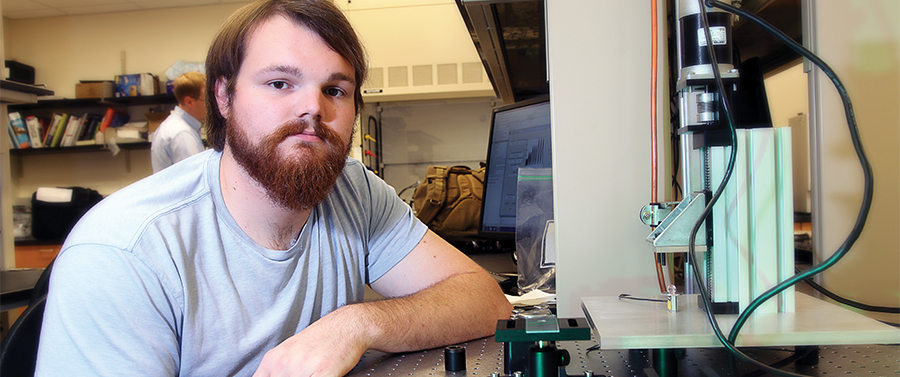


Imagine for a moment being 19 years old, an undergraduate student in college and having the ability to work on research that could one day change the way we see the world-literally. For students in UTSA’s College of Engineering, the chance to have such an impact is a reality. And for those eager to get out of the classroom and into the lab, the college is making it even easier.
“My present research involves studying the effects of age on the stiffness of lenses in the eye,” said Andrew Shiels, a biomedical engineering sophomore. “The immediate application of this research is to corroborate and elaborate on existing data and literature. The long-term application though, at least as far as I’m concerned, is to explore the potential revelations that lens tissues hold in the development of implantable biomimetics.”
By funding undergraduate research programs the College of Engineering is encouraging students to begin thinking in terms of graduate school, while exploring all the possibilities research has to offer.
The college encourages students to commit to the program for the entire academic year with a stipend of $3,500. Faculty mentors receive $1,000 to support their own research initiatives.
All of the research conducted has long-term applications and holds personal value for the students. This year’s students are focusing on projects that involve paving the way for implantable biomimetics in the eye, the fate and transport of nanoparticles in water supplies, and unmanned aircraft used as robotic guidance systems.
For some of the students the work they’ve done has gone beyond the confines of a laboratory. Jessica George has taken advantage of the opportunities offered at UTSA to see how her research into water could change the lives of an entire community in Peru during an Engineers Without Borders trip.
“I am concerned about the water supply for my local community, as well as the world beyond,” said George, a civil engineering senior. “I’m not sure about changing the world, but I’ve seen first-hand that a small group of determined people can assist in starting a well project for a Peruvian village to provide the most basic necessity for its inhabitants-water. Having a safe and dependable water system for a villager in Viña Vieja should be the norm someday in the future.”
The mentors involved understand the value of the work being contributed by the students, and also acknowledge how much students gain from being involved in undergraduate research. They encourage students to further develop their abilities.
“Undergraduate research is not for everyone, but it is extremely important to those who excel in their academic work to ‘stretch’ their skills and knowledge,” Dr. Daniel Pack said.
“Undergraduate research allows students to apply the principles they are learning in the classroom and become more engaged with their major and the university,” added Dr. Heather Shipley. “The students’ affiliation with research helps them to learn to identify and articulate fundamental principles and recognize questions still unanswered in the field. It also makes them competitive when they apply for graduate school.”
Perhaps an even greater reason for the undergraduate research program is to cultivate young minds. Through their close working relationships students form a bond with their mentors and have, in them, a person who can help shape their future.
“I mentor Andrew because I started my research career as an undergraduate,” Dr. Matthew Reilly explained. “My research mentors had a profound influence on my eventual decision to pursue a career in research.”
Regardless of the outcomes, the students who participate in the program can fulfill dreams without having to wait for graduate school.
“I have always been fascinated with robots and how they can communicate to operate in a more efficient way,” said electrical engineering student Jonathan Lwowski. “This research enables me to satisfy my curiosity about unmanned systems and allows me to work towards my goal of getting my doctoral degree.”